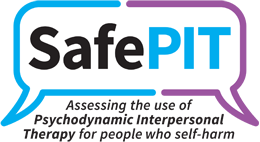For NHS Trusts
For NHS Trusts
What are we doing?
We want to find out whether a type of brief therapy, psychodynamic interpersonal therapy (PIT), helps people who attend an emergency department (ED) after an episode of self-harm, over and above NHS standard care. We are interested in whether PIT helps people reduce future self-harm, ED attendance and improve their mental health and quality of life. We will also measure costs and potential cost-savings as this is important for the NHS.
Intentional non-fatal self-harm usually involves taking an overdose of tablets, cutting or burning. People who self-harm are emotionally distressed and often suicidal. Nearly 9 out of 10 episodes of self-harm are triggered by relationship problems. Over 200,000 people attend EDs each year following self-harm, but a recent survey has shown that most are not offered any psychological therapy. Two recent reviews have suggested that brief therapy may be beneficial for self-harm but larger studies are required to be certain. We have chosen to focus on PIT as it addresses psychological distress and relationship problems, has been shown in a previous smaller study to help people who self-harm, and has been used for many years in self-harm services in the North of England. Another therapy called CBT has also been shown to help people who self-harm, but there are many studies involving CBT and a further trial may not add much to what we know already. User groups also strongly support greater choice of therapy in the NHS.
PIT therapy involves 4 weekly sessions (+ 2 optional booster sessions) and is intended for people who have 3 or fewer prior episodes of self-harm. People who self-harm more frequently require more intensive treatment and we have a separate study (FReSH START) which will assess this. Standard care involves a full psychosocial assessment and a care plan.
Mental health nurses who work in EDs will approach people who have attended hospital following self-harm to see if they are interested in taking part in the study. We will check that people are suitable for the study and those who agree will be allocated by chance to one of 2 groups; PIT as well as standard care or standard care only. We will use data from a national source to find out if people have attended ED again with self-harm over the follow-up period (between 12 -36 months depending when people enter the study). We will also ask all people to complete follow up assessments at 3, 6, 9 and 12 months to find out how they are, in terms of their mental health and quality of life, and what services they have used. We can then decide if PIT is cost-effective for the NHS.
We have involved users with experience of self-harm in this grant application and have a co-applicant who has personal experience of self-harm and considerable experience of raising awareness and advocating for better mental health care. We are a team of psychiatrists, trialists and users of self-harm services. We have experience of conducting previous trials of psychological therapies for self-harm and of running psychological treatment services for people who self-harm in the NHS.
We will publish the results via academic journals and meetings, and social media. We will target relevant user organisations and we will work with our PPI co-applicant to present information in a clear format. Several of us have national roles which will enable the results (if favourable) to be fast- tracked into national policy, one of the best ways of making the treatment available on the NHS.
Who are we looking for and what will be involved?
For the SafePIT trial, we want to include 12 sites across England, with 2-3 therapists per site. We are looking to work with mental health nurses to act as therapists – we will provide training and supervision in the therapy. We will start recruiting to the trial in January 2022.
We are aiming to recruit 770 participants over the 12 sites. Each participant will attend 4 sessions of therapy over a maximum of 3 months, with the option of 2 booster sessions. The trial will be a randomised controlled trial, with half the participants receiving therapy and half receiving NICE-recommended standard care.
It is expected that sites opening early in the recruitment period will recruit around 80 patients, sites that join later will be expected to recruit proportionally fewer. Based on a previous study we anticipate that on average each centre will randomise 3.5 participants per month. Each therapist will see on average two new referrals per month (for ease round up to 4 participants per month; 2 go to usual care, 2 go to therapy). Recruitment is planned to commence in January 2022. Sites are planned to open in a phased process during 2022 with the last site being open by January 2023. Recruitment will continue for a further 12 months to January 2024, assuming progression criteria are achieved.
Why take part as a site?
Training will be provided to all participating therapists and to additional staff who may need to act as back-up in the event of sickness or other absence. This training and the associated supervision will increase the skill set of staff in the Trust. The general therapeutic approach will be readily modifiable to suit other presentations, and so the training will have generalisable benefits for the team.
SafePIT is funded by the NIHR Health Technology Assessment Programme and all participating Trusts receive financial support for participation from NIHR funding streams.
For further information, or expressions of interest, please contact safepit@leeds.ac.uk.

